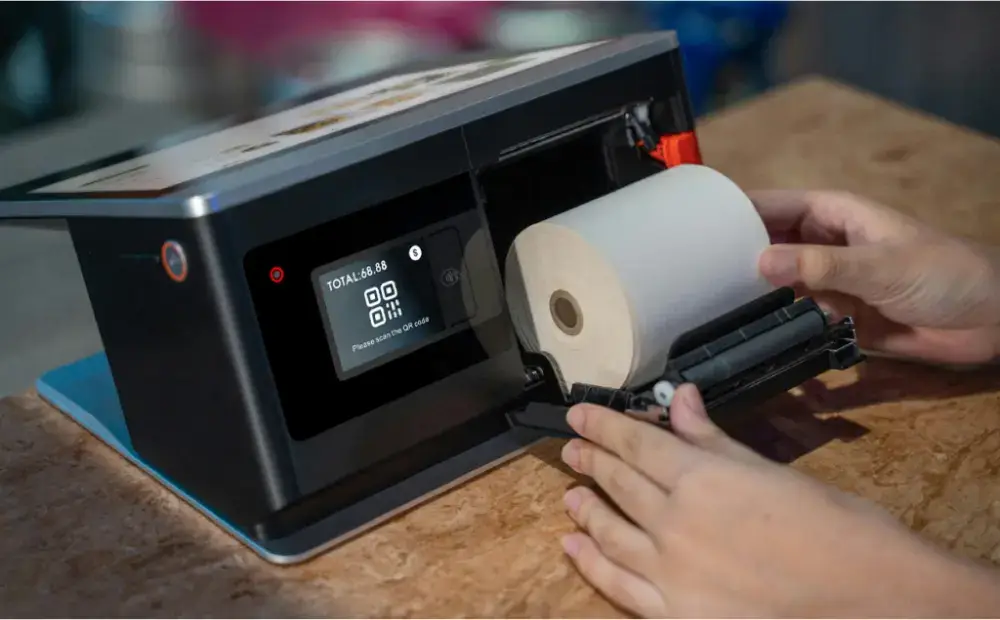You’d think picking a POS machine supplier would be simple. It’s not. You start researching, and suddenly you’re knee-deep in sales jargon, confusing price structures, and long feature lists that all begin to sound the same.
Everyone claims to be the “best,” but no one tells you exactly what you’re paying for, or what you’ll be stuck with once the contract is signed. Many business owners end up with a system that’s too complicated, limited, or unreliable. And switching later? Let’s not even go there.
This guide is here to make sure you don’t end up there. We’ll explain what actually matters when choosing POS suppliers, so you can get exactly what your business needs.
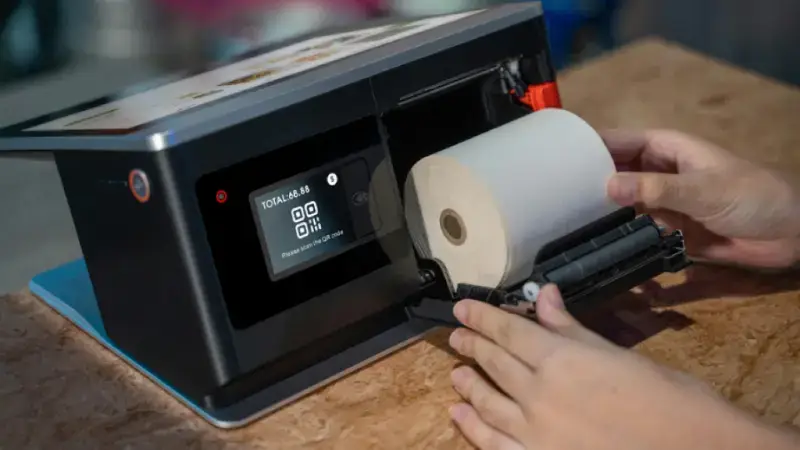
What Is a POS Machine Supplier?
A POS machine supplier is a company that sells or leases point-of-sale equipment and software to businesses. This includes the physical devices used at checkout, like receipt printers or card readers. This also includes the software that runs the system.
A POS supplier is also responsible for helping set everything up to make sure it works smoothly and offering support if anything goes wrong. Some suppliers specialize in certain industries, like restaurants or retail stores, and offer features that fit those business types.
Hence, you’re not just buying a machine when you are choosing a supplier. You need someone who understands how your business runs and can provide a system that actually fits. The right supplier can make everyday tasks easier. The wrong one can slow you down.
Types of POS Suppliers
POS suppliers come in three different types. The right one for your business depends on what you need.
- POS Distributors: They supply POS machines in large quantities, mainly to retailers or resellers, not individual businesses.
- Hardware Vendors: These are the companies that design and sell physical devices, like barcode scanners or receipt printers.
- Full-Service Providers: They handle everything: the hardware, the software, and ongoing support, all in one place. SwiftForce, for example, offers full-service POS solutions, including modern self-service kiosks that help speed up transactions and reduce wait times.
All three types serve a different purpose. If you’re running a business and need a working setup, full-service providers are perhaps your best bet.
Why Choosing the Right Supplier Matters?
Picking the right POS supplier makes a big difference in how smoothly your business runs. Reliable equipment means fewer breakdowns and less frustration at checkout. It also affects how fast transactions happen (something your customers notice immediately!)
On top of that, good POS hardware companies provide reliable support and keep maintenance costs down, so you can save time and money in the long run.
Key Factors to Consider When Choosing a POS Machine Supplier
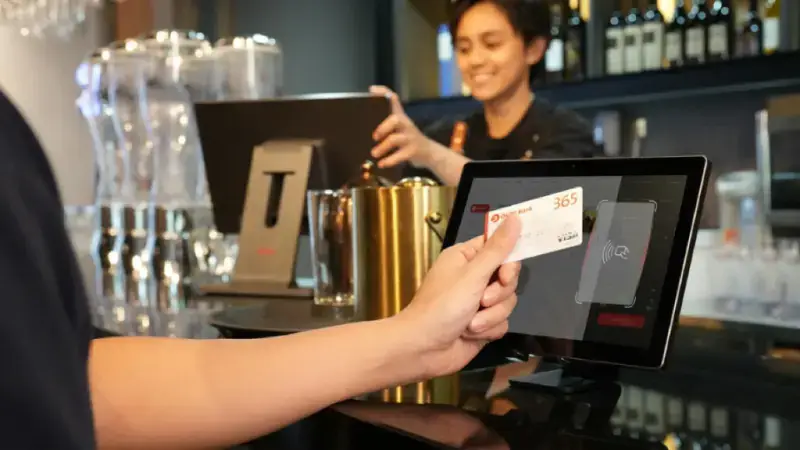
The right POS machine supplier isn’t the one with the cheapest rates or the fanciest device. The ideal partner might offer neither of these. However, what they do provide is reliable products, fair pricing, and ongoing support. To get it right, you need to carefully evaluate a few key factors, which we’ll discuss below.
Product Quality and Reliability
Your POS machine will be handling every sale your business makes. If it’s slow, breaks down often, or can’t keep up during busy times, it’ll cause frustration for both you and your customers.
Look for durable hardware that’s designed for daily use. Fast processing speed is also vital since no one likes to wait at checkout. Also, make sure the system works well with other software you use.
Pro Tip: Check customer reviews and look for suppliers that are popular for reliable machines.
POS Features & Technology
The right features can make your day-to-day work much easier. For instance, a touchscreen interface can help your staff navigate the system quickly. Integrated payment options let you accept credit cards, contactless payments, and cash without complications.
Inventory management is a big plus as it helps you track stock in real time, so you don’t run out of popular items. Another thing to consider is whether you want a cloud-based system, which lets you access data remotely, or an on-premise setup that stores everything locally.
Many modern POS setups, like SwiftForce’s self-service kiosks, combine all these features in one sleek solution that’s especially helpful for fast-paced environments.
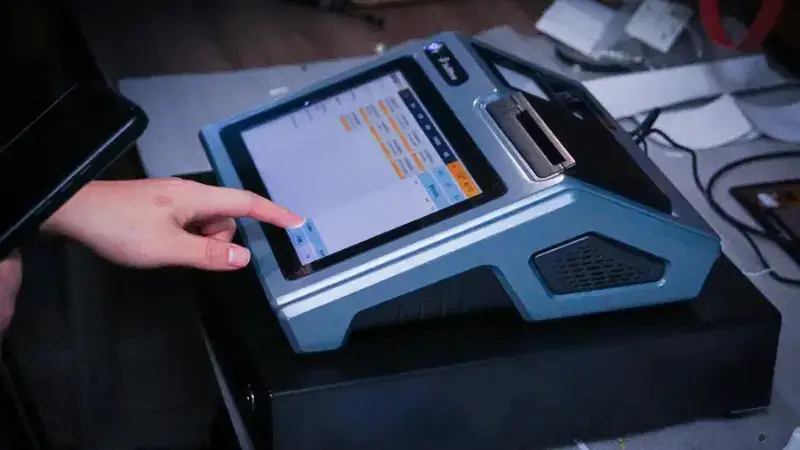
Pro Tip: As a retail store, you will benefit from barcode scanning and detailed inventory tracking. Meanwhile, restaurants often need features like splitting bills or handling tips.
Pricing and Total Cost of Ownership (TCO)
Buying a POS machine is not a mere one-time expense. Think about all the costs involved over time, such as hardware, software licenses, and ongoing support or maintenance fees.
A hardware vendor covers the prices of terminals, scanners, and printers. The software might be charged monthly or as a one-time fee. Don’t forget potential future costs like repairs or upgrades.
Pro Tip: Don’t consider the upfront price only. Compare the total cost over a few years.
Supplier Reputation and Reviews
You want a supplier who will be around for the long haul and won’t disappear when you need help. Check online reviews to see what other customers say. Look for case studies or testimonials that show how the supplier supports businesses similar to yours. If possible, ask the supplier for references you can contact.
Pro Tip: Go with established suppliers who have been in the business for years.
Customer Support and Maintenance
Even the best machines can run into issues. When they do, fast support can save you from lost sales and unhappy customers. Look for suppliers who offer 24/7 technical support, especially if you’re open late or run a busy operation like a restaurant or fast-food chain.
Pro Tip: Always ask the supplier if they offer on-site maintenance options and remote troubleshooting services.
Customization and Integration
No two businesses work exactly the same way. Your POS should fit how you operate, not the other way around. Make sure the system works with your existing software. Also, check if you can add features that matter to you later on.
Pro Tip: Choose suppliers that offer flexible solutions tailored to your industry.
Top POS Machine Suppliers and Distributors
We understand that choosing a POS supplier for your business can be a difficult decision. To help you out, here’s a comparison of the top POS system providers:
Square
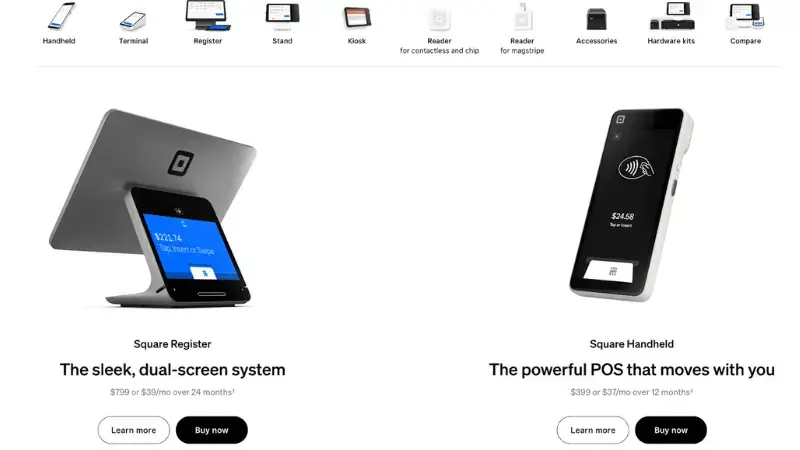
Square is among the popular point-of-sale vendors because it’s simple and doesn’t try to lock you into complicated contracts. It’s great for small businesses that just need something that works, i.e., fast setup, easy to use, and no big upfront cost.
You can get started with just a card reader plugged into your phone, or upgrade to a touchscreen terminal if you need something more polished. It also handles payments, sends digital receipts, and tracks sales in real-time.
You only pay a small fee per transaction, so there’s no monthly subscription for the basic version. If you’re running a coffee cart, pop-up shop, or a small retail store, Square is probably all you need.
Key Features:
- Free basic POS app
- Plug-and-play hardware (card readers, terminals)
- Flat per-transaction fees
- Easy inventory and sales tracking
Best For: Small shops, solo entrepreneurs, cafés, and mobile vendors
Clover
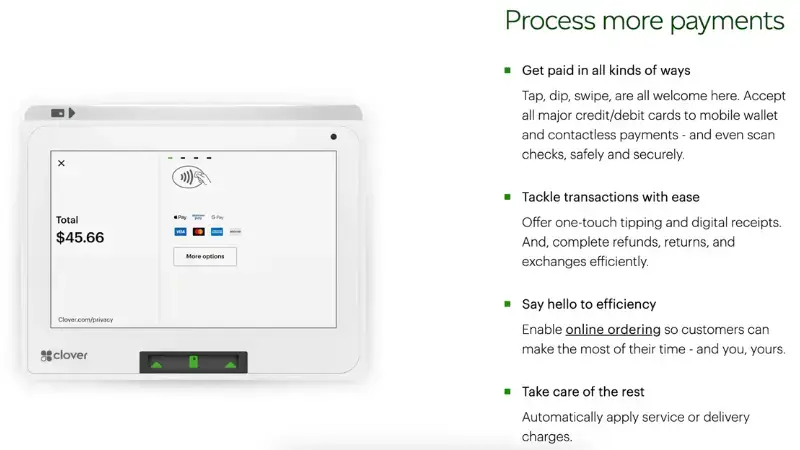
Clover gives you more tools right out of the box, but it also comes with a steeper price tag. Apart from taking payments, it can manage employees, set up loyalty programs, track sales, and customize the system to your industry using add-on apps.
You buy the hardware upfront (like Clover Flex or Clover Station), and then pay a monthly fee based on what software features you need. It’s a good fit if your business has a front desk or counter.
That said, it’s not always the cheapest option, so it’s better suited for businesses that need more than just a payment terminal.
Key Features:
- All-in-one device and software
- Built-in tools for staff, loyalty, and analytics
- Cloud access from anywhere
- App store for industry-specific functions
Best For: Mid-sized retail, service-based businesses, salons, and stores planning to grow
Toast
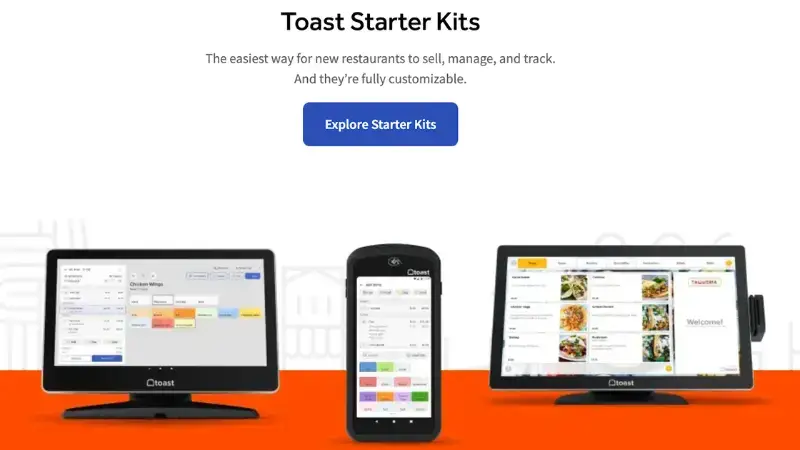
Toast is made specifically for food service, so if you run a restaurant, diner, or food truck, it’s built with you in mind. Unlike general POS systems, Toast handles the fast-paced needs of kitchen staff, waitstaff, and mobile orders.
You can use it to split checks, manage tables, and integrate with food delivery services. Their hardware is tough enough for kitchen environments, and the software helps with things like menu edits, sales reporting, and tipping.
It’s not the cheapest option out there, but if you rely on speed, accuracy, and keeping hungry customers happy, it might be worth the investment.
Key Features:
- Restaurant-specific features (split bills, menu editing)
- Mobile and tableside ordering
- Online delivery integration
- Durable hardware for kitchen use
Best For: Restaurants, cafés, bars, food trucks, and fast-casual dining
Tips for Negotiating with POS Suppliers
Getting a good deal on a POS system doesn’t mean you just find the cheapest option. Rather, a good deal ensures that the system you end up with doesn’t cost you more in the long run and actually fits your business.
Here are a few ways to smartly tackle negotiations with POS system suppliers.

1. Compare Multiple Quotes
Don’t say yes to the first offer that sounds decent. Reach out to at least 3–5 suppliers and ask for detailed quotes. Make sure they break down the pricing clearly, i.e., into hardware, software, setup, support, and any ongoing fees.
If you’re buying more than one terminal, you may ask the payment terminal providers for bulk discounts. Suppliers are often willing to shave off costs when they know you’re shopping around.
Bonus tip? Use competing quotes as leverage. Politely mention you’re comparing offers and most suppliers will either match or throw in something extra.
2. Ask About Warranty and Support
A high-end POS terminal loses its value if it malfunctions within months, leaving you with unexpected repair costs and operational downtime. To mitigate this risk, conduct a thorough review of the hardware warranty and support terms before committing to a purchase.
Key Considerations:
- Warranty Scope & Duration
- Demand at least 12 months of comprehensive coverage, including parts, labor, and shipping (if applicable).
- Clarify whether the warranty is limited (e.g., only specific components) or full-system coverage.
- Check if on-site service is available, particularly for critical failures that disrupt business operations.
- Support Services & Response Times
- Does “support” include 24/7 live assistance or only business-hour availability?
- Are software updates included, or will future versions require additional fees?
- Is there a Service Level Agreement (SLA) guaranteeing response times for urgent issues (e.g., payment processing failures)?
3. Look for Flexible Payment Plans
For new or scaling businesses, substantial capital expenditure on POS hardware and software may strain cash flow. Fortunately, many vendors offer alternative payment models—such as lease-to-own arrangements, subscription-based pricing, or equipment financing—that allow you to deploy advanced technology while preserving working capital.
Be clear about what you’re paying for in a subscription. And double-check if you’ll own the equipment at the end of the lease.
Just don’t be afraid to negotiate terms that suit your cash flow. Most suppliers expect it, and those worth working with will be open to discussion.
FAQs
What is the difference between a POS distributor and a supplier?
A POS distributor usually sells machines in bulk to resellers or large buyers, and they don’t always offer after-sales support. A supplier, on the other hand, sells directly to businesses and often provides setup help, training, and ongoing customer service.
Should I buy or lease a POS machine?
Leasing a POS machine helps reduce upfront costs and is great if you’re just starting or want to stay flexible. But if you can afford to buy, it’s usually cheaper in the long run, especially if you plan to use the same system for years.
How do I choose the right POS for my business?
Start by listing the features you really need, like inventory tracking, payment options, or mobile support. Make sure it can grow with your business and that help is available when you need it. Always check reviews, test a demo if possible, and pick a system that fits your daily workflow AND your budget.
Conclusion
Let’s face it, finding a decent POS supplier can feel like finding a needle in a haystack. But it doesn’t have to be that complicated. The right supplier should make your life easier, not add more stress to your plate.
Ready to Partner with a Trusted POS Supplier?
At SwiftForce, we believe in keeping things simple. We don’t offer one-size-fits-all setups. Instead, we focus on reliable POS solutions that work for how you run your business.
We’ll walk you through the options, answer your questions, and get you what you actually need. If you’re ready to talk, contact SwiftForce today!

